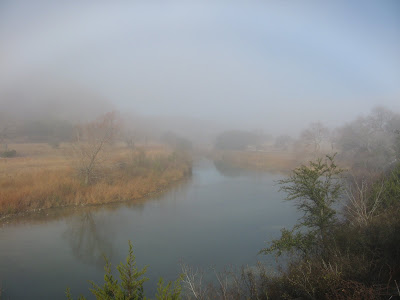
In the mission statement for Madroño Ranch: A Center for Writing and the Environment (“Inspired by the rhythms of the Texas Hill Country, Madroño Ranch offers writers focused on nature and the environment a source and resource for work and rest, solitude and communion”), the inclusion of the word “rest” is no accident. Here’s why:
Joel Salatin, a farmer in Virginia, has developed a philosophy and practicum of farming that is simple and radically countercultural: use the needs and desires of the land, the plants, and the animals to direct farming decisions. As a consequence, his Polyface Farm is not only phenomenally productive, it annually increases the amount of chemical-free topsoil on the land and allows its animals to lead comfortable, healthy, chemical-free lives.
Here’s the real point of interest: the farm consists of about 550 contiguous acres, and Salatin and his family intensively farm only about 100 acres. The rest is “unused” forest; his pigs do forage for acorns there, and some of the trees are selectively milled, but about 80 percent of his land is apparently ignored.
This unused land is considered wasted by conventional farming standards, which would have Salatin cut down the forest and expand his operation, but he’s convinced that the productivity of his actively farmed land requires all those unused acres. They provide the ecological ballast for his doughty craft, helping reduce evaporation in the fields, providing wind breaks, permitting the existence of a complexity of interaction between flora and fauna that supports the entire operation.
Salatin’s insistence on the need for this apparently unproductive forest seems to have a parallel in the rhythms of sleeping and waking and the perception in our culture that sleep is time wasted, time that could be used “productively.” While some people seem to have a genetic mutation that allows them to sleep less than the general population and still function well, most of us become significantly less productive, not more, when we try to cut back on our sleep. Studies show that people become psychotic when deprived of uninterrupted sleep over extended periods; forced wakefulness is a well-known torture technique. (Any college student can tell you this.) Even so, our out-of-kilter culture continues its assault on this maddeningly “unproductive” necessity.
Just as they need to eat, to work, to worship, people—and maybe all creatures—need time dedicated not just to sleeping, but to dreaming as well. People whose sleep is subtly interrupted at the dream phase eventually develop the symptoms of those denied all sleep. (I don’t think I’m making this up.) Dreaming time, like Salatin’s untouched acreage, is necessary to the health and integrity of individual organisms and their ecosystems. I’ve come to think of the planet’s shrinking wilderness as its dreaming time. The list of activities or places declared unproductive by the market culture has grown significantly during my lifetime: time to cook, to play (if you aren’t a child, and sometimes if you are), to make music or art (if you’re not an expert), to observe a sabbath, to allow plants and animals to grow at their own pace, to make money that benefits whole communities rather than just a few individuals. By consciously using the word “rest” in our mission statement, we want to mount the ramparts and defend the borders of dreaming time.
What we’re reading
Heather: Barbara Brown Taylor, An Altar in the World: A Geography of Faith
Martin: David Winner, Brilliant Orange: The Neurotic Genius of Dutch Football

nicely said! the Alliance of Artists Communities talks about artists' residencies as places of rest as often as they are places of frenzied work (and how both are "productive"). a funder told me once that it's like the biblical idea of letting the fields like fallow every seven years — that abundance only comes out of rest and reflection.